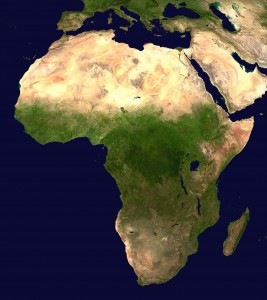The International Award Foundation work tirelessly in Africa to bring the programme to young people across the continent, an endeavour close to the heart of Fellow of the Duke of Edinburgh’s World Fellowship, Tunde Folawiyo.
Founded in 1956, the ethos of the Duke of Edinburgh Award is to help young people, whatever their adversities, to reach their full potential. Through practical activities and teamwork, the aim is to develop mind, body and soul, building confidence and self-esteem. By 1975 over 1,000,000 young people had participated in the scheme. In 1986 the Duke of Edinburgh’s third son, HRH Prince Edward, achieved his Gold Award. In 1988, the International Award Association was established to promote the award globally. Prince Edward continues to play an active role in the charity both as a UK and International Trustee. He is Chairman of the International Council, which governs the programme in 140 countries.
![By Claudio Allia (Own work) [CC-BY-SA-3.0 (http://creativecommons.org/licenses/by-sa/3.0) or GFDL (http://www.gnu.org/copyleft/fdl.html)], via Wikimedia Commons Tunde Folawiyo](http://upload.wikimedia.org/wikipedia/commons/thumb/c/c9/MathareValleySlum.jpg/256px-MathareValleySlum.jpg) The Duke of Edinburgh Award has changed the lives of millions of young people for the better, and none more than Kenyan, Julius Irungu Krush, who grew up in the slums of Mathare. The makeshift shelters have no electricity; no running water; no sanitation. Julius and his family were under constant threat – both from opportunist crime and their exposure to the elements. Julius is the youngest son of a single mother who had three other children to care for. Schooling fees and learning materials slid from Julius’s grasp as his mother struggled to put food on the table.
The Duke of Edinburgh Award has changed the lives of millions of young people for the better, and none more than Kenyan, Julius Irungu Krush, who grew up in the slums of Mathare. The makeshift shelters have no electricity; no running water; no sanitation. Julius and his family were under constant threat – both from opportunist crime and their exposure to the elements. Julius is the youngest son of a single mother who had three other children to care for. Schooling fees and learning materials slid from Julius’s grasp as his mother struggled to put food on the table.
Julius recounts the despondency of the slums – the bleak acceptance of those around him that there was no escape from the poverty trap. Julius dropped out of school twice. Surrounded by negative peer pressure and with no dreams, confidence, aspirations or ambition, Julius attempted suicide.
This young boy’s life was turned around when he was introduced to the Duke of Edinburgh’s International programme. Within six months he had achieved his Bronze Award, quickly rising through the ranks to Silver and Gold. Along the way, Julius said he reaped so many rewards: confidence; inspiration. The experience changed his life forever. Through the Service section, he learnt the importance of community, so much so that after achieving the Gold Award he went on to start a mentorship programme himself called Raising Hope, to inspire the children of the slums of Mathare.
Stories like Julius’s are an inspiration to us all, and none more than Tunde Folawiyo, a long-time supporter of the Duke of Edinburgh Award. As director of the African Leadership Academy, entrepreneur Tunde Folawiyo is committed to helping young people to achieve their full potential.

 Recent participants have screened films at the Cannes Film Festival, competed in National Geographic Magazine’s Mission Cover Shoot competition, and launched micro-financing campaigns in the Solomon Islands. In 2013, the Duke of Edinburgh charity showed a ten percent increase in new participants, and over one hundred thousand Duke of Edinburgh awards were earned in the UK. The number of global participants is currently tallied at 850,000, with over 8 million total participants in the programme’s fifty-eight year history.
Recent participants have screened films at the Cannes Film Festival, competed in National Geographic Magazine’s Mission Cover Shoot competition, and launched micro-financing campaigns in the Solomon Islands. In 2013, the Duke of Edinburgh charity showed a ten percent increase in new participants, and over one hundred thousand Duke of Edinburgh awards were earned in the UK. The number of global participants is currently tallied at 850,000, with over 8 million total participants in the programme’s fifty-eight year history.![By Paliano (Own work) [Public domain], via Wikimedia Commons Tunde Folawiyo](http://upload.wikimedia.org/wikipedia/commons/thumb/d/d2/Prince_Phillip_of_Edinburgh.jpg/256px-Prince_Phillip_of_Edinburgh.jpg) With a history spanning over fifty years, the Duke of Edinburgh Award programme has affected the lives of countless youths in the UK and around the world. The programme, commonly called DofE, was started by Prince Philip, Duke of Edinburgh. To counteract the modern social forces, described by German educator Kurt Hahn, that were making young adults less imaginative, adventurous, and socially minded, the DofE encourages participants to achieve goals in five categories: volunteer work, physical activity, practical skills, adventurous journey, and a residential category that requires participants to live away from home.
With a history spanning over fifty years, the Duke of Edinburgh Award programme has affected the lives of countless youths in the UK and around the world. The programme, commonly called DofE, was started by Prince Philip, Duke of Edinburgh. To counteract the modern social forces, described by German educator Kurt Hahn, that were making young adults less imaginative, adventurous, and socially minded, the DofE encourages participants to achieve goals in five categories: volunteer work, physical activity, practical skills, adventurous journey, and a residential category that requires participants to live away from home.![By DrRandomFactor (Own work) [CC-BY-SA-3.0 (http://creativecommons.org/licenses/by-sa/3.0)], via Wikimedia Commons Tunde Folawiyo](http://upload.wikimedia.org/wikipedia/commons/thumb/4/4b/Flag_map_of_British_Kenya_%281920_-_1963%29.png/256px-Flag_map_of_British_Kenya_%281920_-_1963%29.png) Those who know of the DofE, like Tunde Folawiyo, will probably be aware of the profound impact which this programme has had on many Kenyans. It has helped hundreds of people in this country to develop the skills and traits which they need to create a better life for themselves and their communities. Take for instance, Olunga Otieno; as a result of his involvement with the DofE, he went from living in poverty, to having a successful career in education.
Those who know of the DofE, like Tunde Folawiyo, will probably be aware of the profound impact which this programme has had on many Kenyans. It has helped hundreds of people in this country to develop the skills and traits which they need to create a better life for themselves and their communities. Take for instance, Olunga Otieno; as a result of his involvement with the DofE, he went from living in poverty, to having a successful career in education. Those who are
Those who are ![By Kim Traynor (Own work) [CC-BY-SA-3.0 (http://creativecommons.org/licenses/by-sa/3.0)], via Wikimedia Commons Tunde Folawiyo](http://upload.wikimedia.org/wikipedia/commons/thumb/b/bf/Palace_of_Holyroodhouse%2C_Edinburgh.jpg/256px-Palace_of_Holyroodhouse%2C_Edinburgh.jpg) The ceremony took place at the Palace of Holyroodhouse, and was attended not only by the award recipients and their families, but also by a number of celebrities from the sport, entertainment, music and art industries. Some of the top names included David Murdoch, the Olympic curler, and Kevin Guthrie, the actor who starred in the production ‘Sunshine on Leith’.
The ceremony took place at the Palace of Holyroodhouse, and was attended not only by the award recipients and their families, but also by a number of celebrities from the sport, entertainment, music and art industries. Some of the top names included David Murdoch, the Olympic curler, and Kevin Guthrie, the actor who starred in the production ‘Sunshine on Leith’.![By The DofE (Own work) [Public domain], via Wikimedia Commons Tunde Folawiyo](http://upload.wikimedia.org/wikipedia/commons/9/91/DofE-Logo-2008.gif) The DofE has served as an enormous means of encouragement since its establishment, inspiring millions of young people throughout the world to explore optimal self-discovery. In keeping true to its commitments to foster the future success of promising youth around the UK and beyond, the DofE employs a variety of requirements for participants to complete in order to be awarded the prestigious award.
The DofE has served as an enormous means of encouragement since its establishment, inspiring millions of young people throughout the world to explore optimal self-discovery. In keeping true to its commitments to foster the future success of promising youth around the UK and beyond, the DofE employs a variety of requirements for participants to complete in order to be awarded the prestigious award. ![By Leedsdoggod (Own work) [CC-BY-3.0 (http://creativecommons.org/licenses/by/3.0)], via Wikimedia Commons Tunde Folawiyo](http://upload.wikimedia.org/wikipedia/commons/d/d0/DofE-group.jpg) While the DofE is today one of the world’s foremost organisations for youth development, its beginnings are less recognised. Founded by a small team of esteemed professionals, the DofE was conceived as a way of motivating and inspiring boys aged 15 to 18 to strive towards a strong sense of self during the often difficult years between adolescence and adulthood.
While the DofE is today one of the world’s foremost organisations for youth development, its beginnings are less recognised. Founded by a small team of esteemed professionals, the DofE was conceived as a way of motivating and inspiring boys aged 15 to 18 to strive towards a strong sense of self during the often difficult years between adolescence and adulthood.
![By Kardapoltsevvd (Own work) [CC-BY-SA-3.0 (http://creativecommons.org/licenses/by-sa/3.0) or GFDL (http://www.gnu.org/copyleft/fdl.html)], via Wikimedia Commons Tunde Folawiyo](http://upload.wikimedia.org/wikipedia/commons/8/82/SVS_CCF.jpg)